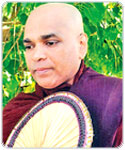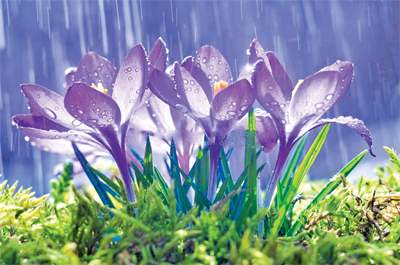|
Lesson for mindfulness - part 17
Important guidance for
practitioners
 Battaramulla Battaramulla
Siri Sudassanarama
sadaham senasuna
Ven. Dr. Mirisse Dhammika thero
I have compiled the following pieces of advice concerning meditation using the
guidelines provided by Gnaratana, Rahula, Nyanponika, Levete and Harvey.
Just sit and observe what is going on with one’s thoughts. Take the whole thing
as an experiment. Don’t get distracted by your expectations about the results
and do not be anxious for any result.
 One should not hurry though their meditation practice. When one gets used to
meditation, his/her deep awareness seeks to see reality exactly as it is. For
example, When sensual desire comes, deep awareness sees its nature: that it is
not permanent and that it may disappear in a few moments. One should not store
his/her images, opinions, and interpretations in the mind for the duration of
the practice. One should not hurry though their meditation practice. When one gets used to
meditation, his/her deep awareness seeks to see reality exactly as it is. For
example, When sensual desire comes, deep awareness sees its nature: that it is
not permanent and that it may disappear in a few moments. One should not store
his/her images, opinions, and interpretations in the mind for the duration of
the practice.
One should not make any judgments, but let thoughts come and go, let things be,
accepting things as they are. We should just let our experience be what it is
and practice observing it from moment to moment.
Patience is very important in mediation; there is no hurry, no shortcuts to help
us gain instant results. So take your time. Settle yourself on a cushion or
chair, and let your mind come to concentrate on your subject.
One should learn how not to get upset over his/her flaws and failings, but to
see all the phenomena in the mind as being natural and understandable. For
example, past mistakes and failures are in the past. The only thing one can do
is to be as fully aware as possible of one’s present thoughts, and let
mindfulness guide you on the right way. Learn how to exercise equanimity, a
disinterested acceptance with respect to everything.
Everything should be subject to mindful, investigative mediation. One should not
accept anything without investigating, it, just because it sounds wise and nice.
See all problems as life challenges: use mindfulness towards the negative side
of life. See them as opportunities to learn and to grow.
(8) One should not make contrasts: when one contrasts things, one becomes
attached to things, and this creates egoistic feelings. For example, when a girl
contrasts herself to another girl who is prettier than she, she feels envy or
jealousy. This type of comparison is a mental habit, and it leads to unwholesome
feelings such as envy, pride, jealousy, and hatred. |